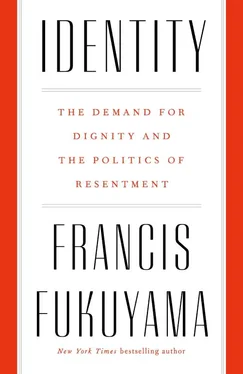However, my critics missed another point. They did not note that the original essay had a question mark at the end of the title, and they did not read the later chapters of The End of History and the Last Man that focused on the problem of Nietzsche’s Last Man.
In both places I noted that neither nationalism nor religion were about to disappear as forces in world politics. They were not about to disappear because, I argued back then, contemporary liberal democracies had not fully solved the problem of thymos . Thymos is the part of the soul that craves recognition of dignity; isothymia is the demand to be respected on an equal basis with other people; while megalothymia is the desire to be recognized as superior. Modern liberal democracies promise and largely deliver a minimal degree of equal respect, embodied in individual rights, the rule of law, and the franchise. What this does not guarantee is that people in a democracy will be equally respected in practice, particularly members of groups with a history of marginalization. Entire countries can feel disrespected, which has powered aggressive nationalism, as can religious believers who feel their faith is denigrated. Isothymia will therefore continue to drive demands for equal recognition, which are unlikely to ever be completely fulfilled.
The other big problem is megalothymia. Liberal democracies have been pretty good at providing peace and prosperity (though somewhat less so in recent years). These wealthy, secure societies are the domain of Nietzsche’s Last Man, “men without chests” who spend their lives in the endless pursuit of consumer satisfaction, but who have nothing at their core, no higher goals or ideals for which they are willing to strive and sacrifice. Such a life will not satisfy everyone. Megalothymia thrives on exceptionality: taking big risks, engaging in monumental struggles, seeking large effects, because all of these lead to recognition of oneself as superior to others. In some cases, it can lead to a heroic leader like a Lincoln or a Churchill or a Nelson Mandela. But in other cases, it can lead to tyrants like Caesar or Hitler or Mao who lead their societies into dictatorship and disaster.
Since megalothymia has historically existed in all societies, it cannot be overcome; it can only be channeled or moderated. The question I raised in the final chapter of The End of History and the Last Man was whether the modern system of liberal democracy tied to a market economy would provide sufficient outlets for megalothymia. This problem was fully recognized by the American founding fathers. In their effort to create a republican form of government in North America, they were aware of the history of the fall of the Roman Republic and worried about the problem of Caesarism. Their solution was the constitutional system of checks and balances that would distribute power and block its concentration in a single leader. Back in 1992, I suggested that a market economy also provided outlets for megalothymia. An entrepreneur could become fabulously wealthy while contributing at the same time to general prosperity. Or such individuals could compete in Ironman events or set records for the number of Himalayan peaks climbed or build the world’s most valuable internet company.
I actually mentioned Donald Trump in The End of History as an example of a fantastically ambitious individual whose desire for recognition had been safely channeled into a business (and later an entertainment) career. Little did I suspect back then that, twenty-five years on, he would not be satisfied with business success and celebrity, but would go into politics and get elected president. But it is not at all inconsistent with the general argument I was making about potential future threats to liberal democracy, and the central problem of thymos in a liberal society. {6} 6 I am grateful to those people who actually took the time to read my book. See in particular Paul Sagar, “The Last Hollow Laugh,” Aeon , March 21, 2017, https://aeon.co/essays/was-francis-fukuyama-the-first-man-to-see-trump-coming . Please note that some of the links referenced throughout this work may no longer be active.
Such figures had existed in the past with names such as Caesar or Hitler or Perón, who had led their societies down disastrous paths to war or economic decline. To propel themselves forward, such figures latched onto the resentments of ordinary people who felt that their nation or religion or way of life was being disrespected. Megalothymia and isothymia thus joined hands.
In the present volume I am returning to themes that I began to explore in 1992 and have been writing about ever since: thymos, recognition, dignity, identity, immigration, nationalism, religion, and culture. In particular, it incorporates the Lipset Memorial Lecture on immigration and identity that I gave in 2005, and the Latsis Foundation lecture I delivered in Geneva in 2011 on immigration and European identity. {7} 7 Seymour Martin Lipset Lecture; see Francis Fukuyama, “Identity, Immigration, and Liberal Democracy,” Journal of Democracy 17 (2) (2006): 5–20; Latsis lecture “European Identity Challenges,” given at the University of Geneva in November 2011, see “The Challenges for European Identity,” Global , January 11, 2012, http://www.theglobaljournal.net/group/francis-fukuyama/article/469/ .
In some places this volume more or less repeats passages from earlier writings. I apologize if any of this seems repetitious, but I’m pretty confident that few people have taken the time to follow this particular string and to see it as a coherent argument relating to developments in the present.
Demand for recognition of one’s identity is a master concept that unifies much of what is going on in world politics today. It is not confined to the identity politics practiced on university campuses, or to the white nationalism it has provoked, but extends to broader phenomena such as the upsurge of old-fashioned nationalism and politicized Islam. Much of what passes for economic motivation is, I will argue, actually rooted in the demand for recognition and therefore cannot simply be satisfied by economic means. This has direct implications for how we should deal with populism in the present.
According to Hegel, human history was driven by a struggle for recognition. He argued that the only rational solution to the desire for recognition was universal recognition, in which the dignity of every human being was recognized. Universal recognition has been challenged ever since by other partial forms of recognition based on nation, religion, sect, race, ethnicity, or gender, or by individuals wanting to be recognized as superior. The rise of identity politics in modern liberal democracies is one of the chief threats that they face, and unless we can work our way back to more universal understandings of human dignity, we will doom ourselves to continuing conflict.
* * *
I would like to thank a number of friends and colleagues for providing comments on this manuscript: Sheri Berman, Gerhard Casper, Patrick Chamorel, Mark Cordover, Katherine Cramer, Larry Diamond, Bob Faulkner, Jim Fearon, David Fukuyama, Sam Gill, Anna Gryzmala-Busse, Margaret Levi, Mark Lilla, Kate McNamara, Yascha Mounk, Marc Plattner, Lee Ross, Susan Shell, Steve Stedman, and Kathryn Stoner.
Special thanks are due to Eric Chinski, my editor at Farrar, Straus and Giroux, who has worked tirelessly with me on several books now. His sense of logic and language and his wide knowledge of substantive issues have been of enormous benefit to the current volume. I am also thankful for the support given me by Andrew Franklin at Profile Books for this and all previous volumes.
As always, I am grateful to my literary agents, Esther Newberg at International Creative Management and Sophie Baker at Curtis Brown, as well as to all the other people who support them. They have done amazing work in getting my books published in the United States and all over the world.
Читать дальше












